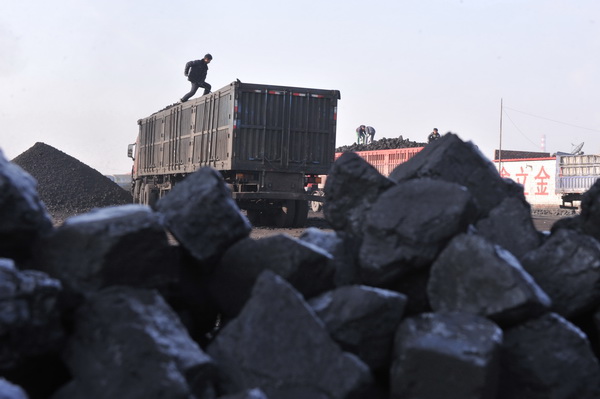


By Yu Huapeng (于华鹏)
Issue 617, April 29, 2013
News, page 5
Translated by Zhang Xiaoxi
Original article: [Chinese]
After two days in Qingdao, Hong Daoqing (洪道清) failed to persuade Qingdao Iron & Steel Company to order any coking coal from him.
Just as he was feeling completely frustrated, Hong’s telephone rang with more bad news from Manager Ma at Laiwu Iron & Steel Company. Ma told him that his company had shut off four blast furnaces and the rest were just working at half capacity.
Hong had intended to sell coking coal to Ma, but Ma declined it, saying his company was only using a third as much as it used to. Besides, they’d switched to a cheaper grade coal in order to reduce production costs.
Hong Daoqing is a salesman for Shenhuo International Trade Co., Ltd. (河南神火国贸有限公司) in Henan province, and is responsible for the sale of coking coal in Northern China. Qingdao Iron & Steel Company and Shandong Iron & Steel Company are Hong’s main customers.
Hong has failed to fulfill his sale targets for each of the past three months. “This was the busy season for steel production and coking coal sales over the past several years,” he said. “Many steel plants have stopped producing these days.”
Hong said that May to August will be the off-season for coking coal sales. He worries this summer may actually be the “winter” for his industry.
Salesman’s Nightmare
According to Hong, steel plants are sitting on a large stock of goods. Qingdao Steel, for example, now has a 50,000-ton inventory of semi-finished products and 10 million tons of finished products like steel wiring for tires. If they can’t unload these stockpiles, all they can do is scale back production, or even halt it altogether.
Qingdao Steel used to use about 2,000 tons of coking coal each month, but now it’s dropped to just 800. “Now our inventories of coking coal are around 70,000-80,000 tons,” Hong says. “The company's top leaders are very anxious, and so are we."
Hong also said that the contract between Qingdao Iron & Steel Company and his Shenhuo International Trade Co. calls for the former to buy 15,000 tons of coking coal every month. However, now they only buy 12,000 tons every three months. “During this special period, the contract is useless,” Hong said. “We made less money last year, but this year we may lose money.”
Overall Recession
Heavy industries like iron and steel aren’t the only ones suffering. Light industries involving food, textiles, leather, paper and household chemical production are also experiencing slumps. According to data released by the National Energy Administration in March, electricity consumption for light industry fell by 13.1 percent.
“A significant decrease in light industry electricity consumption indicates weak economic growth,” said Song Xinyu (宋新宇), chairman of Yizhong Chuangye Technology Co., Ltd. (北京易中创业科技有限公司) in Beijing.
Song Xinyu’s company has just completed a survey on the state of small and medium-sized Chinese companies. The results are discouraging.
Small and medium-sized enterprises produce about 60 percent of China’s GDP, 50 percent of its tax revenue and 70 percent of its exports. They also account for nearly 80 percent of the jobs in urban areas.
Song Xinyu’s survey was carried out from December 2012 to January 2013. He collected a total of 778 questionnaires; 639 of which were completed by company chairmen or general managers.
The survey data showed that 55 percent of the companies saw no growth in turnover in 2012 and 68 percent said they saw no growth in net profit. 43 percent said they feel heavy pressure and nearly 60 percent said they’re pessimistic about China's economic development prospects over the next three years.
Almost 85 percent of the business owners believed that the current market is "competitive" and that “rampant counterfeiting and imitation " and "unfair competitive advantages of state-owned enterprises” make the competitive environment worse.


